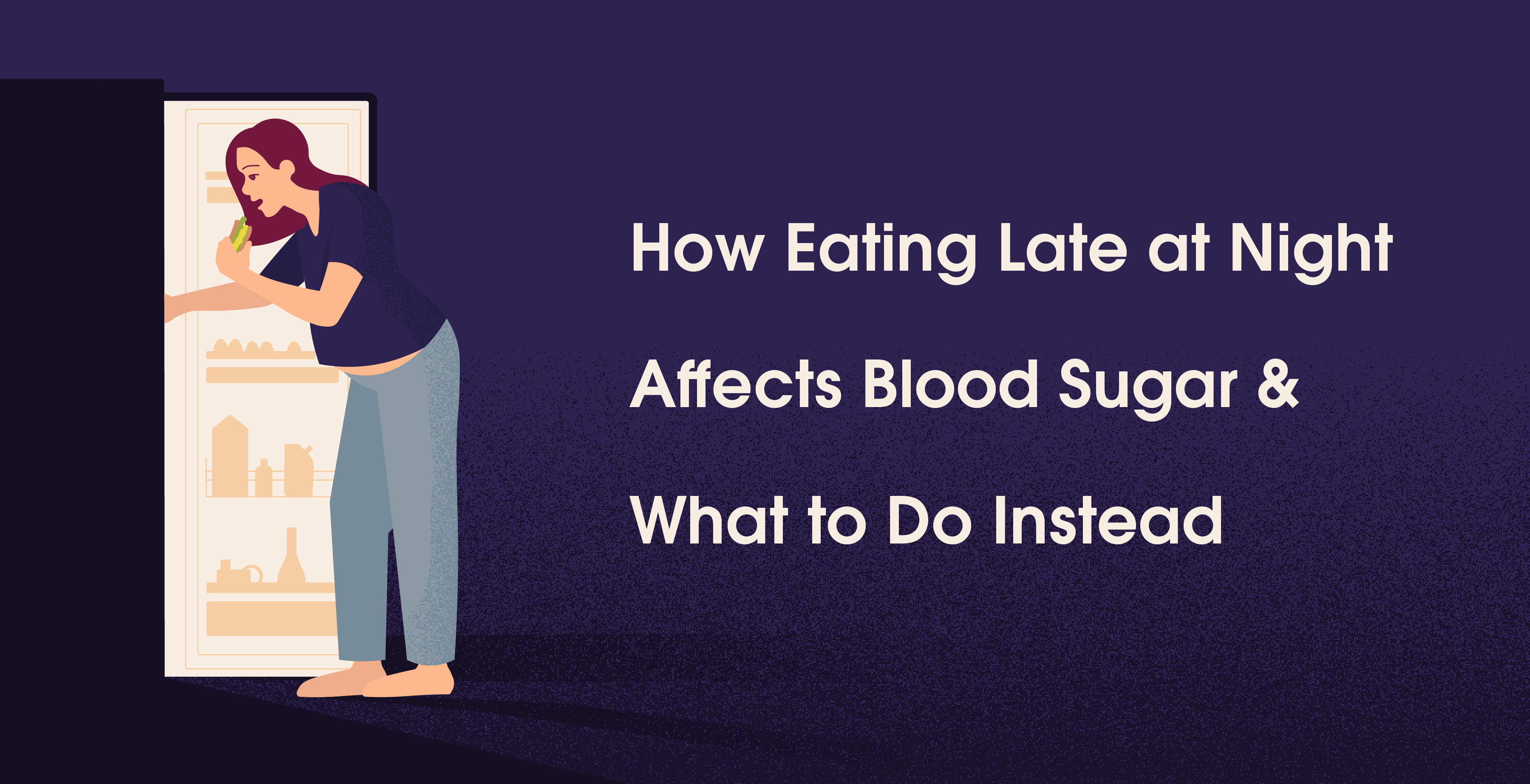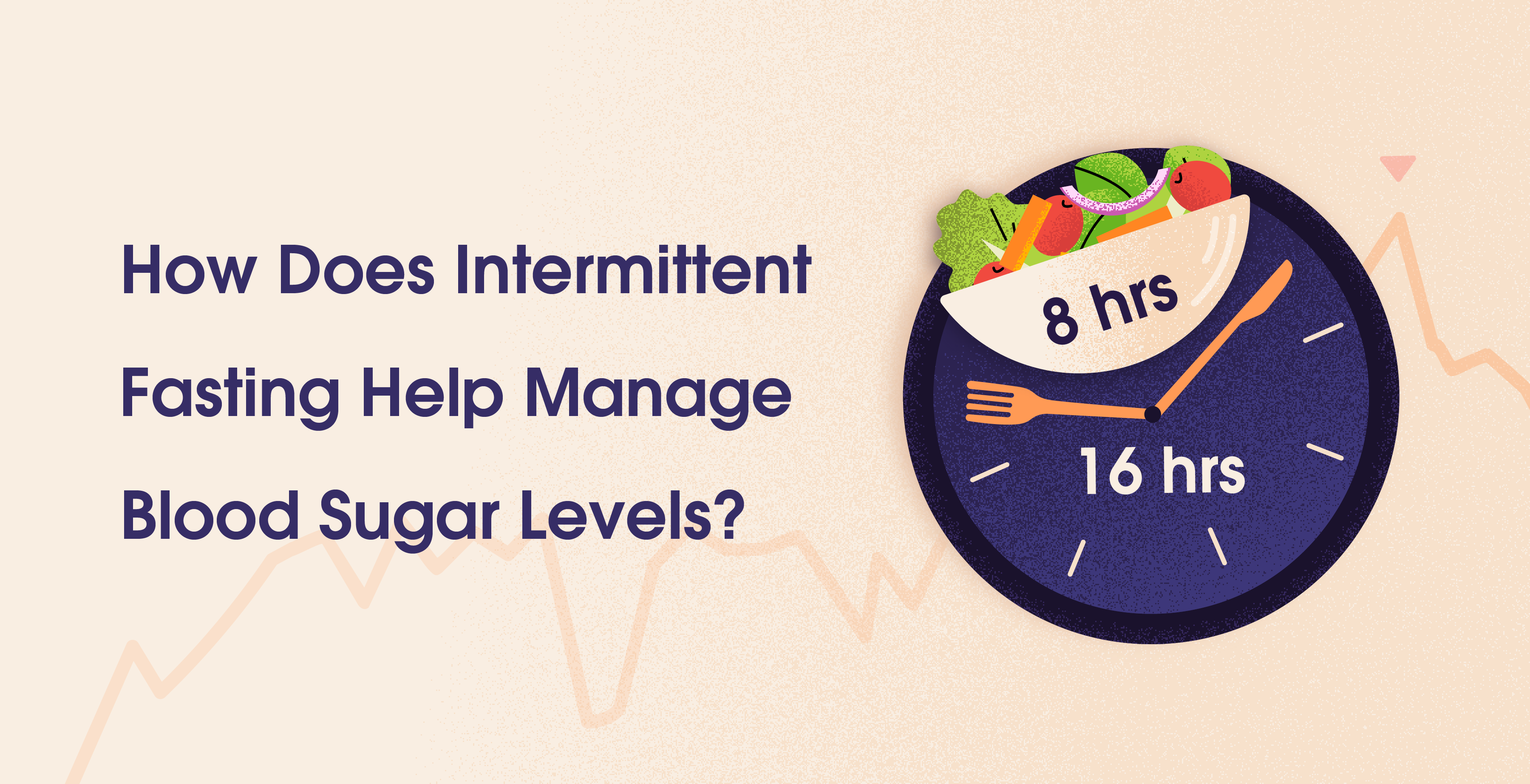Prediabetes Lifestyle Changes You Should Make For Prevention
Jan 13, 2024
Ashima Raizada



Table Of Contents
Most of us have grown up believing that diabetes is just something that happens because it runs in the family, right? It's in your genes, so why even bother trying to stay healthy? Prediabetes lifestyle changes? What even is that?
But guess what? New research is turning that old idea on its head, especially when it comes to prediabetes. It's not all about your genes - you have the power to change your health story. In fact, by adopting simple prediabetes lifestyle changes, you can significantly reduce your risk of going from prediabetic to diabetic. Studies show that adopting a healthier lifestyle can slash that risk by up to 20%. (1)
So, let's explore this exciting new perspective and discover how you can rewrite your health journey, especially if you're prediabetic.
Highlights
New research challenges the idea that diabetes is solely genetic; lifestyle changes can significantly reduce the risk of prediabetes turning into diabetes.
Genetics play a role in prediabetes, but it's how lifestyle choices interact - unhealthy eating, lack of exercise, and smoking - that increases the risk.
Key lifestyle changes: treating food as medicine, aligning with circadian rhythm, strategic eating, 7-9 hours of sleep, and a mix of aerobic and strength exercises.
To prevent prediabetes: quit smoking, moderate alcohol, manage stress with practices like meditation, keep weight under control (BMI & lt; 26), and stay hydrated for improved blood sugar levels.
Prediabetes: A Genetic Or Lifestyle Disorder?
The real question is, how do you get prediabetes? Is it a genetic inevitability or a lifestyle-driven concern? These questions often cross our minds.
While there's no denying that genetics play a role in your prediabetes risk, it's not the sole determining factor. Studies have shown that specific gene mutations are linked to type 2 diabetes, but they don't act in isolation. These genetic factors interact with your lifestyle choices, like unhealthy eating habits, lack of exercise, obesity, smoking and more, to increase your prediabetes risk. So, it's not just about your genes; it's about how your lifestyle choices combine with your genetic predisposition to affect your prediabetes risk.
In other words, while genetics may make you more susceptible, it's your lifestyle that ultimately plays a crucial role.
What Lifestyle Changes Can You Make to Prevent Prediabetes?
There are a ton of prediabetes lifestyle changes you can make. In fact, lifestyle changes leading to weight loss and a healthy diet are the number one thing you can do to prevent or reverse prediabetes. Here are some of them:
Food as Medicine
Think of food as the fuel that keeps your body running smoothly. Making the right choices can be a game-changer, especially for your blood sugar levels. Opt for nutrient-rich options packed with fiber and protein, and you'll notice a more stable sugar situation. (2)
But it's not just about what you eat; when and how you eat also play a vital role. Your body follows a natural rhythm throughout the day, known as the circadian rhythm, which influences hormone cycles. Eating in sync with this rhythm can help maintain steady blood sugar levels. For example, having a protein-rich breakfast and wrapping up dinner early can do wonders for sugar stability and help keep those extra calories at bay. Plus, there's a clever sequence to follow at every meal: start with fiber, then proteins and fats, and finish with carbs and sugars. This order will help you feel full faster without eating extra calories. It also helps your body convert food into sustained energy while limiting blood sugar spikes.
For those trying to shed those extra pounds, this will help keep that extra weight off.
Follow your Circadian Rhythm & Sleep Cycle
Your circadian rhythm is much more than your sleep cycle. It changes the way your hormones (particularly sleep and hunger ones) operate. When your circadian rhythm is disrupted, and your sleep is impaired, you crave more carbs, binge eat or feel more hungry since your hunger hormones (leptin & ghrelin) go out of whack. This results in impaired glucose metabolism, ultimately increasing your risk of diabetes. To reset your circadian rhythm:
Aim to sleep 7-9 hours (everyone needs a different amount so aim for getting enough sleep that you do not feel fatigued during the following day)
Get some morning sun
Stop eating at least 3-4 hours before bedtime
Avoid bright lights at night
Have a light dinner
Restrict caffeine intake after 2 PM
Avoid strenuous exercise at night
Start Exercising
Getting active is super important for tackling prediabetes and helping to keep it from turning into a diabetic condition. When you exercise, your body gets a boost, using up glucose and helping your cells absorb it better, which brings down those high sugar levels. Both hitting the gym for strength training and fun aerobic activities like dancing or swimming work well because they help with both glucose absorption and weight loss. pick activities that you enjoy but it's always advisable to include both aerobic and muscle-building exercises in order to make it a holistic routine. And guess what? You don't have to stress about when you exercise - evenings work too, just avoid intense workouts right before bedtime! (3)
Keeping Stress in Check
Managing stress is a crucial part of the lifestyle changes that can help prevent prediabetes. While it's impossible to completely eliminate stress, the key is to learn how to handle it.
Start by incorporating stress-busting practices into your daily routine, such as journaling, meditation, yoga, and deep-breathing exercises. These methods work wonders in reducing cortisol, the stress hormone, and helping you manage stress effectively.
Also, don't underestimate the power of a morning soak in the sun. Taking time to relax and rejuvenate in the morning can help alleviate stress and give your cortisol levels a healthy boost. (4)
Watch Your Alcohol Intake
Prediabetes management involves keeping a close watch on your alcohol consumption. The American Diabetes Association recommends moderation - limit yourself to one daily drink if you're a woman or a man. A drink can be a small glass of wine, a beer can, or a shot of liquor. Going beyond these limits could significantly raise your risk of transitioning to type 2 diabetes. (5)
Quit Smoking
Smoking can become a significant hurdle on your path to reversing prediabetes. Lighting up tobacco increases your chances of progressing to type 2 diabetes by 30% to 40% compared to non-smokers, and the more you smoke, the higher your risk soars. So, if you're determined to enhance your health and bid prediabetes goodbye, quitting cigarettes is a crucial step. It's all about giving your body the best opportunity to heal and get back on track. (6)
Drink More Water
Drinking water with all the other lifestyle changes can help keep your diabetes at bay. Studies show that people with prediabetes who follow methods to control it show significant improvement in their blood sugar levels compared to those who don't. Water helps flush out excess glucose from the blood. When you're not drinking enough, your blood volume drops, but your sugar levels stay the same.
Diabetic Prevention Programs
If you find all of the above too overwhelming to do by yourself, you can consider enrolling yourself in a personalized diabetes prevention program. From digital health coaches like Trst Health, you can receive help from experts in prediabetes prevention and prevent yourself from prediabetes.
Conclusion
In a nutshell, the idea that diabetes is purely in our genes is transitioning, especially with prediabetes. While genes do play a part, our lifestyle changes everything. Simple changes like choosing the right foods, syncing with our body's circadian rhythm, staying active, managing stress, moderating alcohol, quitting smoking, and staying hydrated can seriously cut the risk of sliding from prediabetes to diabetes.
References
Prediabetes and Lifestyle Modification: Time to Prevent a Preventable Disease - PMC
Dietary Fiber Intake and Type 2 Diabetes Mellitus: An Umbrella Review of Meta-analyses - PMC
The essential role of exercise in the management of type 2 diabetes - PMC
Nutrition Therapy for Adults With Diabetes or Prediabetes: A Consensus Report
Smoking and Diabetes | Overviews of Diseases/Conditions | Tips From Former Smokers | CDC
Most of us have grown up believing that diabetes is just something that happens because it runs in the family, right? It's in your genes, so why even bother trying to stay healthy? Prediabetes lifestyle changes? What even is that?
But guess what? New research is turning that old idea on its head, especially when it comes to prediabetes. It's not all about your genes - you have the power to change your health story. In fact, by adopting simple prediabetes lifestyle changes, you can significantly reduce your risk of going from prediabetic to diabetic. Studies show that adopting a healthier lifestyle can slash that risk by up to 20%. (1)
So, let's explore this exciting new perspective and discover how you can rewrite your health journey, especially if you're prediabetic.
Highlights
New research challenges the idea that diabetes is solely genetic; lifestyle changes can significantly reduce the risk of prediabetes turning into diabetes.
Genetics play a role in prediabetes, but it's how lifestyle choices interact - unhealthy eating, lack of exercise, and smoking - that increases the risk.
Key lifestyle changes: treating food as medicine, aligning with circadian rhythm, strategic eating, 7-9 hours of sleep, and a mix of aerobic and strength exercises.
To prevent prediabetes: quit smoking, moderate alcohol, manage stress with practices like meditation, keep weight under control (BMI & lt; 26), and stay hydrated for improved blood sugar levels.
Prediabetes: A Genetic Or Lifestyle Disorder?
The real question is, how do you get prediabetes? Is it a genetic inevitability or a lifestyle-driven concern? These questions often cross our minds.
While there's no denying that genetics play a role in your prediabetes risk, it's not the sole determining factor. Studies have shown that specific gene mutations are linked to type 2 diabetes, but they don't act in isolation. These genetic factors interact with your lifestyle choices, like unhealthy eating habits, lack of exercise, obesity, smoking and more, to increase your prediabetes risk. So, it's not just about your genes; it's about how your lifestyle choices combine with your genetic predisposition to affect your prediabetes risk.
In other words, while genetics may make you more susceptible, it's your lifestyle that ultimately plays a crucial role.
What Lifestyle Changes Can You Make to Prevent Prediabetes?
There are a ton of prediabetes lifestyle changes you can make. In fact, lifestyle changes leading to weight loss and a healthy diet are the number one thing you can do to prevent or reverse prediabetes. Here are some of them:
Food as Medicine
Think of food as the fuel that keeps your body running smoothly. Making the right choices can be a game-changer, especially for your blood sugar levels. Opt for nutrient-rich options packed with fiber and protein, and you'll notice a more stable sugar situation. (2)
But it's not just about what you eat; when and how you eat also play a vital role. Your body follows a natural rhythm throughout the day, known as the circadian rhythm, which influences hormone cycles. Eating in sync with this rhythm can help maintain steady blood sugar levels. For example, having a protein-rich breakfast and wrapping up dinner early can do wonders for sugar stability and help keep those extra calories at bay. Plus, there's a clever sequence to follow at every meal: start with fiber, then proteins and fats, and finish with carbs and sugars. This order will help you feel full faster without eating extra calories. It also helps your body convert food into sustained energy while limiting blood sugar spikes.
For those trying to shed those extra pounds, this will help keep that extra weight off.
Follow your Circadian Rhythm & Sleep Cycle
Your circadian rhythm is much more than your sleep cycle. It changes the way your hormones (particularly sleep and hunger ones) operate. When your circadian rhythm is disrupted, and your sleep is impaired, you crave more carbs, binge eat or feel more hungry since your hunger hormones (leptin & ghrelin) go out of whack. This results in impaired glucose metabolism, ultimately increasing your risk of diabetes. To reset your circadian rhythm:
Aim to sleep 7-9 hours (everyone needs a different amount so aim for getting enough sleep that you do not feel fatigued during the following day)
Get some morning sun
Stop eating at least 3-4 hours before bedtime
Avoid bright lights at night
Have a light dinner
Restrict caffeine intake after 2 PM
Avoid strenuous exercise at night
Start Exercising
Getting active is super important for tackling prediabetes and helping to keep it from turning into a diabetic condition. When you exercise, your body gets a boost, using up glucose and helping your cells absorb it better, which brings down those high sugar levels. Both hitting the gym for strength training and fun aerobic activities like dancing or swimming work well because they help with both glucose absorption and weight loss. pick activities that you enjoy but it's always advisable to include both aerobic and muscle-building exercises in order to make it a holistic routine. And guess what? You don't have to stress about when you exercise - evenings work too, just avoid intense workouts right before bedtime! (3)
Keeping Stress in Check
Managing stress is a crucial part of the lifestyle changes that can help prevent prediabetes. While it's impossible to completely eliminate stress, the key is to learn how to handle it.
Start by incorporating stress-busting practices into your daily routine, such as journaling, meditation, yoga, and deep-breathing exercises. These methods work wonders in reducing cortisol, the stress hormone, and helping you manage stress effectively.
Also, don't underestimate the power of a morning soak in the sun. Taking time to relax and rejuvenate in the morning can help alleviate stress and give your cortisol levels a healthy boost. (4)
Watch Your Alcohol Intake
Prediabetes management involves keeping a close watch on your alcohol consumption. The American Diabetes Association recommends moderation - limit yourself to one daily drink if you're a woman or a man. A drink can be a small glass of wine, a beer can, or a shot of liquor. Going beyond these limits could significantly raise your risk of transitioning to type 2 diabetes. (5)
Quit Smoking
Smoking can become a significant hurdle on your path to reversing prediabetes. Lighting up tobacco increases your chances of progressing to type 2 diabetes by 30% to 40% compared to non-smokers, and the more you smoke, the higher your risk soars. So, if you're determined to enhance your health and bid prediabetes goodbye, quitting cigarettes is a crucial step. It's all about giving your body the best opportunity to heal and get back on track. (6)
Drink More Water
Drinking water with all the other lifestyle changes can help keep your diabetes at bay. Studies show that people with prediabetes who follow methods to control it show significant improvement in their blood sugar levels compared to those who don't. Water helps flush out excess glucose from the blood. When you're not drinking enough, your blood volume drops, but your sugar levels stay the same.
Diabetic Prevention Programs
If you find all of the above too overwhelming to do by yourself, you can consider enrolling yourself in a personalized diabetes prevention program. From digital health coaches like Trst Health, you can receive help from experts in prediabetes prevention and prevent yourself from prediabetes.
Conclusion
In a nutshell, the idea that diabetes is purely in our genes is transitioning, especially with prediabetes. While genes do play a part, our lifestyle changes everything. Simple changes like choosing the right foods, syncing with our body's circadian rhythm, staying active, managing stress, moderating alcohol, quitting smoking, and staying hydrated can seriously cut the risk of sliding from prediabetes to diabetes.
References
Prediabetes and Lifestyle Modification: Time to Prevent a Preventable Disease - PMC
Dietary Fiber Intake and Type 2 Diabetes Mellitus: An Umbrella Review of Meta-analyses - PMC
The essential role of exercise in the management of type 2 diabetes - PMC
Nutrition Therapy for Adults With Diabetes or Prediabetes: A Consensus Report
Smoking and Diabetes | Overviews of Diseases/Conditions | Tips From Former Smokers | CDC
Table Of Contents
Table Of Contents
Table Of Contents
Read More


Mar 25, 2025
Sayfali Rawlani


Mar 20, 2025
Sayfali Rawlani


Mar 6, 2025
Sayfali Rawlani



Company
Copyright © 2025 trst health. All right reserved.

